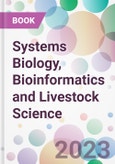The book covers 4 key themes:
Introduction to Systems Biology in Livestock Science: Uncover the foundation of integrating systems biology with omics data for animal scientists.Multi-scale Modeling Techniques: Explore how multi-scale modeling is shaping the future of system biology.
Livestock Viral Diseases: Gain insights into how systems biology is revolutionizing our understanding of livestock viral diseases.
Single Cell RNA-Sequencing: Understand the potential of this advanced technique in studying livestock animals at a cellular level.
This book is a timely resource for students and researchers, offering a pathway to comprehend the crucial role systems biology plays in sustainable livestock production and management.
Table of Contents
- Contents
- Foreword 1
- Foreword 2
- Preface
- About-The-Editors
- List of Contributors
- Omics Data for Animal Scientists
- Sandeep Swargam and Indu Kumari
- Introduction
- Section A: Introduction to Systems Biology and Its Perspectives
Chapter 2. Application of Multi-Scale Modeling Techniques in System Biology
Chapter 3. The Perspective of Physiome Modelling in Systems Biology: New Horizon
- Section B: Systems Biology to Study Livestock and Related
- Diseases
Chapter 5. Systems Biology and Livestock Gut Microbiome
Chapter 6. Omics in Livestock Animals: Improving Health, Well-Being, and Production
Chapter 7. Livestock Viral Diseases and Insights into Systems Biology
- Section C: Integration of Recent and Developing Techniques With
- Systems Biology for Better Outcome
Chapter 9. Importance and Potential Applications of Nanobiotechnology and Systems
- Biology for Livestock Science
- Section D: Future Aspects of Systems Biology in Livestock Sciences
- And Future Prospect
- Future Prospect
- Livestock Animals
- Conclusion
- References
- Biology
- Shweta Sharma and Dinesh Kumar
- Introduction
- Elements of System Biology
- System Definition
- Central Attributes of Biological Models
- Irreducibility
- Emergence
- Complexity
- Modularity
- Fragility and Robustness
- Various Systems of Biological Models
- Different Strategies to Build a Model
- Multi Scale Methods
- Method of Quasi-Continuum (Qc)
- Approach Integrating Quantum and Molecular Mechanics (Qm-Mm)
- Multi-Scale Approach Without Equations
- Gap-Tooth Scheme
- Coarse Projective Integration
- Patches Dynamics
- Heterogeneous Multi-Scale Process
- Method of Multiple Grid (Mg)S
- Method for Multi-Scale Agent-Based Modeling
- Complex Automata
- Multi-Scale Models and Biology
- Multi-Scale Models of Tumour Growth
- Silicon Cell Model
- Artificial Intelligence Ai in System Biology
- System Biology and Biostatistics
- Applications of System Biology
- System Biology in Pharmacology and System Medicine
- Precision Medicine and System Biology
- Future Perspectives
- Conclusion
- References
- New Horizon
- Prachi P. Parvatikar, Shrilaxmi Bagali, Pallavi S. Kanthe, Aravind V. Patil and Kusal
- K. Das
- Introduction
- From Reductionism to Systems Biology
- Molecular Biology from a Reductionist Perspective
- Limitations of the Reductionist Approach
- The Emergence of Systems Biology
- Top-Down and Bottom-Up Approaches in Systems Biology
- Finding the Balance Between Reductionism and Systems Biology
- Physiome: New Horizons of Systems Biology
- Concept of Physiome
- Physiome Project
- History
- Physiome and Physiology
- The Virtual Human Physiome
- Role of Human Physiome in Personalized Drug Development
- Physiome in Livestock Animals
- Integrative Physiological Modeling
- Models Development
- Data Requirement for Model Development
- Steps Involved in Physiome Model Development
- Databases
- Development of Modules
- Hypothesis Testing
- Validation and Verification
- Verification
- Validation
- Qualitatively
- Quantitatively by Steady-State
- Quantitatively in Dynamics
- Ontology
- Gene Structure Simulation
- Kinetic Modeling
- Physiome Modeling in Various Organs
- Heart
- Cardiac Cell Models
- Lungs
- Kidney
- Microcirculatory Modeling
- Therapeutics
- Animal Physiome Model
- Future Directions
- Conclusion
- Abbreviations
- References
- Kushal Thakur, Dixit Sharma, Disha Chauhan, Danish Mahajan, Kanika Choudhary,
- Bhavna Brar, Amit Kumar Sharma, Reshma Sinha, Ranjit Kumar, Sunil Kumar And
- Rakesh Kumar
- Introduction
- Some Fish Species as a Model Organism for Systems Biology
- Omics in Fisheries Science
- Fish Genomics
- Transcriptomics in Fisheries
- Proteomics in Fisheries
- Role of Protein-Protein Interaction Network in Fishes
- Metabolomics in Fisheries
- Integration of Fish Omics Data by Systems Biology
- Conclusion
- Acknowledgement
- References
- Shyamalima Saikia, Minakshi Puzari and Pankaj Chetia
- Introduction
- Diversity of Microbiomes in Livestock/Farm Animals
- Microbiota of Ruminants
- Microbiota of Pig
- Technologies for Microbiome Research- Past, Present, and Future
- Bioinformatics Tools in Microbiome Analysis
- The Characterization of Gut Microbiota in Livestock Using
- Taxonomic Marker Gene
- Functional Annotation and Metabolic Recons- Truction of Gut
- Microbiota Using Metagenomics, Metatranscriptomics, And
- Metaproteomic Analysis
- Detection of the Microbial Metabolite of Gi Tract Using Meta-
- Metabolomics in Livestock
- Concluding Remarks
- References
- And Production
- Dixit Sharma, Disha Chauhan, Sunil Kumar, Ankita Sharma, Kushal Thakur
- Kanika Choudhary, Jigmet Yangchan, Rakesh Kumar and Ranjit Kumar
- Introduction
- Omics Technologies and Animal Genome
- Genomics
- Transcriptomics
- Single Cell Sequencing
- Proteomics
- Biomarker Discovery & Early Diagnosis of Disease
- Metabolomics
- System Biology in Animal Disease
- Conclusion
- Acknowledgements
- References
- Debajit Dey, Zaved Hazarika, Akhilesh Kumar Pandey and Subhomoi Borkotoky
- Introduction
- Viruses Affecting Livestock
- Avian Influenza Virus (Aiv)
- Newcastle Disease Virus (Ndv)
- Infectious Bursal Disease Virus (Ibdv)
- Bovine Respiratory Disease (Brd)
- Bovine Respiratory Syncytial Virus (Brsv) and Bovine Parainfluenza 3 Virus
- (Bpiv3)
- Bovine Herpesvirus-1 (Bhv-1)
- Bovine Viral Diarrhea Virus (Bvdv)
- Foot and Mouth Disease Virus (Fmdv)
- African Swine Fever Virus (Asfv)
- Application of Systems Biology Approaches in Livestock Animal
- Viruses
- Avian Influenza
- Bovine Respiratory Disease
- Newcastle Disease Virus
- African Swine Fever Virus
- Conclusion and Future Prospects
- Acknowledgements
- References
- Padmani Sandhu, Indu Kumari and Sandeep Swargam
- Introduction
- Branches of Proteomics
- Quantitative Proteomics
- Clinical Proteomics
Author
- Anupam Nath Jha
- Sandeep Swargam
- Indu Kumari








